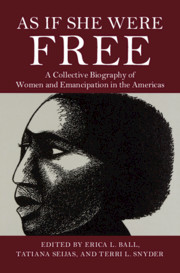Book contents
- As If She Were Free
- As If She Were Free
- Copyright page
- Dedication
- Contents
- Figures
- Contributors
- Elizabeth Catlett and the Form of Emancipation
- Acknowledgments
- Introduction
- Part I Claiming Emancipation during the Rise of New World Slavery
- Part II Experiencing Freedom during Slavery’s Expansion
- Part III Envisaging Emancipation during Second Slavery
- Part IV Enacting Emancipation in the Aftermath of Slavery
- 20 María Remedios del Valle, Nineteenth-Century Argentina
- 21 Lumina Sophie, Nineteenth-Century Martinique
- 22 Emma Lane Coger, Nineteenth-Century Illinois, Iowa, and Missouri (US)
- 23 Laura E. Davis Titus, Nineteenth-Century Norfolk, Virginia (US)
- 24 Carrie Williams Clifford, Nineteenth- and Early Twentieth-Century Ohio (US)
- Bibliography
- Index
20 - María Remedios del Valle, Nineteenth-Century Argentina
from Part IV - Enacting Emancipation in the Aftermath of Slavery
Published online by Cambridge University Press: 24 September 2020
- As If She Were Free
- As If She Were Free
- Copyright page
- Dedication
- Contents
- Figures
- Contributors
- Elizabeth Catlett and the Form of Emancipation
- Acknowledgments
- Introduction
- Part I Claiming Emancipation during the Rise of New World Slavery
- Part II Experiencing Freedom during Slavery’s Expansion
- Part III Envisaging Emancipation during Second Slavery
- Part IV Enacting Emancipation in the Aftermath of Slavery
- 20 María Remedios del Valle, Nineteenth-Century Argentina
- 21 Lumina Sophie, Nineteenth-Century Martinique
- 22 Emma Lane Coger, Nineteenth-Century Illinois, Iowa, and Missouri (US)
- 23 Laura E. Davis Titus, Nineteenth-Century Norfolk, Virginia (US)
- 24 Carrie Williams Clifford, Nineteenth- and Early Twentieth-Century Ohio (US)
- Bibliography
- Index
Summary
María Remedios del Valle was a free black woman from Buenos Aires. After following her husband and sons to the front lines during Argentina’s wars for independence from Spain beginning in 1810, María Remedios del Valle became part of a community of soldiers.First a nurse, and later a military captain, she served in various capacities – soldier, spy, and caregiver – alongside the soldiers who fought for Argentina’s independence. By fighting with the revolutionary army María Remedios del Valle fought for the freedom of her nation. In recognition of her distinguished military service, she received a pension and later became known as the “Mother of the Nation.” But the irony of this designation cannot be underestimated. Remedios del Valle, a black female heroine, is the mother of a country that is still considered a “white” nation.
- Type
- Chapter
- Information
- As If She Were FreeA Collective Biography of Women and Emancipation in the Americas, pp. 359 - 372Publisher: Cambridge University PressPrint publication year: 2020

